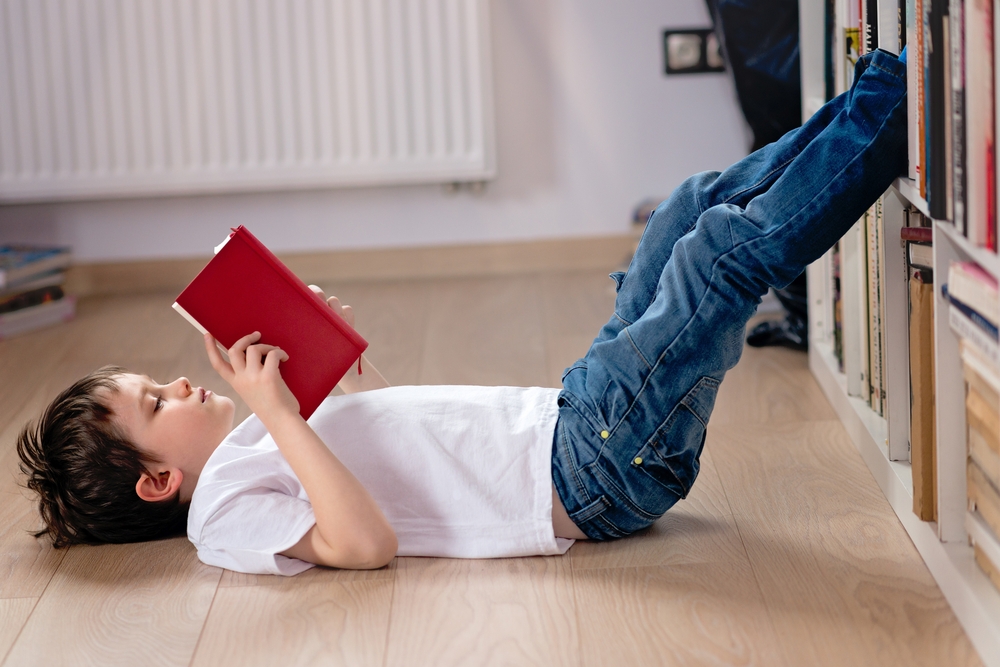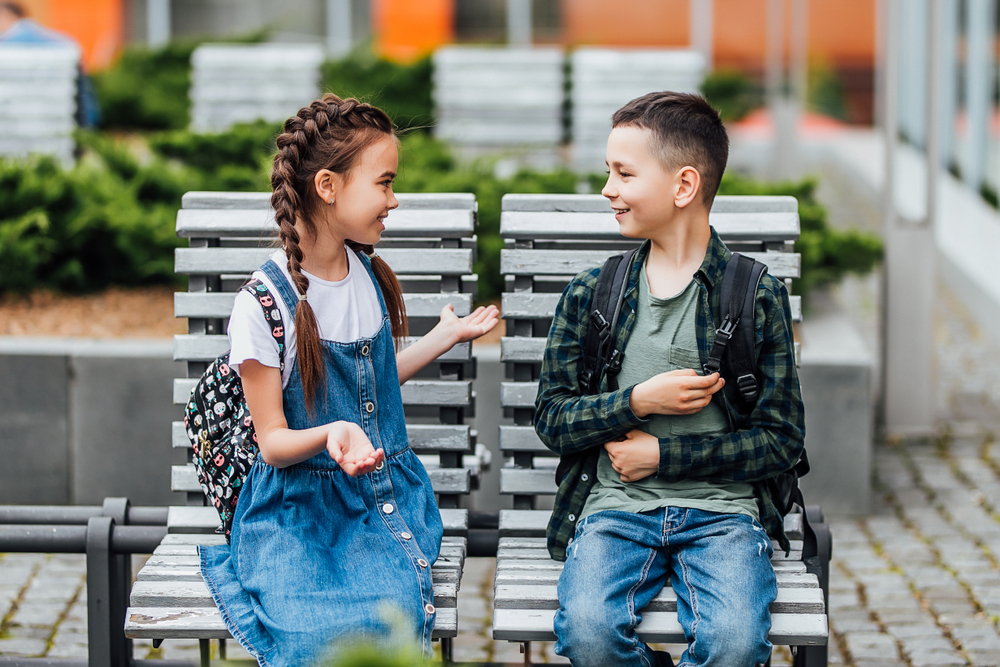
/ Resources /
Advice
Are Homeschool Students Happier?

Every study of which I am aware (and I have gone looking and know where to look) has found that Homeschooled kids, statistically, on average, show more social adjustment and prosocial behaviour and civic engagement than their mainstream school peers.
Of course, every bell curve has its tails, but the research paints a pretty clear picture that Homeschooling produces students that are well-adjusted (as well as academically proficient). The question often asked is why. Here are a few suggestions as to why:
They Get Dedicated Support: One on One Time
One important way to keep kids happy learning is to provide one on one instruction. You can get through the lessons very quickly without any distractions. More importantly, you can develop a level of trust, provide a safer and happier environment than you can find in a mainstream school. There is much research that highlights the fact the environment is extremely important.
It can be a very unhappy situation for kids to go through the whole class in darkness, and not understand the lessons of the day, when Homeschooling children receive personalised attention and have all their questions answered. Of course, parents don’t need to have all the answers. Showing you are also learning, and how to reach out for support are also vital skills to teach your children.
Less Time Wasted Means More Time For Learning
How much time does a student in mainstream school really have for learning? Apparently not as much as you’d think. In primary school there are assemblies, library, rehearsals, waiting for quiet, recess, lunch and even just the time wasted waiting for materials to be handed out. Much of the time is spent in transit, commuting, and walking to and from class.
When homeschooling, your kids don’t need to go anywhere. And this saves valuable time. Most Euka students do Maths and English lessons each day and then depending on the Grade level, they do an extra 1 or 2 subjects. You will find a solid 3 hours of learning at home is more than can be achieved in a mainstream school day.
Fewer Distractions Means Happier Kids
While homeschooling there will be fewer things to distract your kids, so they will be happier and more focused. A recent article I came across talked about how many distractions there are now in a mainstream classroom. From phones going off, messaging, and behaviour problems like bullying, the negative distractions. Studies have shown that a high percentage of teachers, over 68%, report that distractions are on the rise and hinder classroom teaching.
Less Behavioural Problems
Other kinds of distractions that impede students’ happiness in school are behaviour problems. With many students experiencing learning challenges, the classroom can be tricky for the child with challenges as well as the child without them. Children that require extra support can struggle in times when it is not provided, and this can lead to anxiety which at times shows up in behaviours that distract other children. If your child needs support, the opportunity to focus on praising and positive reinforcement and other techniques makes them happier, more confident and allows them to learn more efficiently. When Homeschooling with Euka, the program is individualised to ensure the student can work at their own level in the various subjects, rather than the one-size -fits all model. In a peaceful accepting environment, frustration is kept to a minimum and learning times can be carefully chosen to fit in with the child’s own needs.
Kids do Better Academically in Homeschool
Many studies show that Homeschooled kids do well academically and perform better on standardised tests. This can lead to happier kids if they are doing well in their studies and they are highly motivated. Clearly standardised tests are not a common measure of happiness. But for many families, this can be a huge source of stress and unhappiness in mainstream schools. Academically driven students are keen to express their learning by demonstrating it via testing. For those students, Homeschooling allows them to move ahead with an individualised, extension focused program.
No Homework in Homeschooling Makes Kids Happy!
Once you are done learning for the day, you can do other activities or just play! Students all over the country, return home from school, only to begin homework. This robs kids of valuable time to just be kids. The importance of play, developing passions and exploring talents, cannot be overemphasised.
As the Euka program enables more personalised teaching & learning, the pace is quicker. All lessons are set out clearly and students become independent learners quite early in their educational journey.
Engaged and Involved Parents Leads to Happier Kids
Engaged parents lead to better results in a child’s education as research shows. Positive results and overall well-being will create a happier environment for all including Homeschooled kids. When you Homeschool, you are naturally engaged because you are a part of your child’s progress. With all the planning taken care of by the Euka teaching team, parents can relax into the support role. This bond that you develop leads to happier kids and more satisfying results.
Less Testing and Comparisons in Homeschooling
Less testing and reduced amounts of comparison in Homeschooling also leads to happier kids. One big factor that sets many kids into a frenzy is exams. We can all get nervous before we take the dreaded exams because no matter what age we are, the stress of this can lead to very unhappy kids. At Euka we want students to show their learning through relevant practical experiences rather than just testing to find out what they remember. Real learning is transferable into new contexts. Work samples are used right through the year to ensure kids are learning and thriving while Homeschooling.
There is no need for excessive testing since you will have more thorough instruction and you may pace the lessons and material to the child’s level and speed. If you need more time to review and go over some difficult material, you can! There is also no comparison of scores to their peers.
All in all, there is little doubt that when provided with an education program that fits their needs, support, and a loving environment, Homeschool students, are, on the whole, far happier than their mainstream school counterparts.

You may also like

Welcome to the first series of Euka Stories. The purpose of this series is to give you a glimpse into the everyday lives of homeschooling families by shedding light on their challenges, triumphs, and trials. Our first story is about one of our family’s – The Rogers, who are travelling around Australia with their 2 […]
Welcome to the first series of Euka Stories. The purpose of this series is to give you a glimpse into the everyday lives of homeschooling families by shedding light on their challenges, triumphs, and trials. Our first story is about one of our family’s – The Rogers, who are travelling around Australia with their 2 […]

More and more parents are finding themselves facing the task of homeschooling without the luxury of time and research. This can occur due to various circumstances such as a sudden change in health diagnosis, a bullying incident, a family’s decision to move, or external factors that disrupt regular school attendance. Accidental homeschooling often involves parents […]
More and more parents are finding themselves facing the task of homeschooling without the luxury of time and research. This can occur due to various circumstances such as a sudden change in health diagnosis, a bullying incident, a family’s decision to move, or external factors that disrupt regular school attendance. Accidental homeschooling often involves parents […]

It may sound unnecessary to help your child find their voice when they are constantly demanding and outspoken, however helping a child find their voice means more than letting them say whatever they like, whenever they like. Finding their voice allows them to communicate effectively and appropriately. It is supporting and empowering them to develop […]
It may sound unnecessary to help your child find their voice when they are constantly demanding and outspoken, however helping a child find their voice means more than letting them say whatever they like, whenever they like. Finding their voice allows them to communicate effectively and appropriately. It is supporting and empowering them to develop […]





